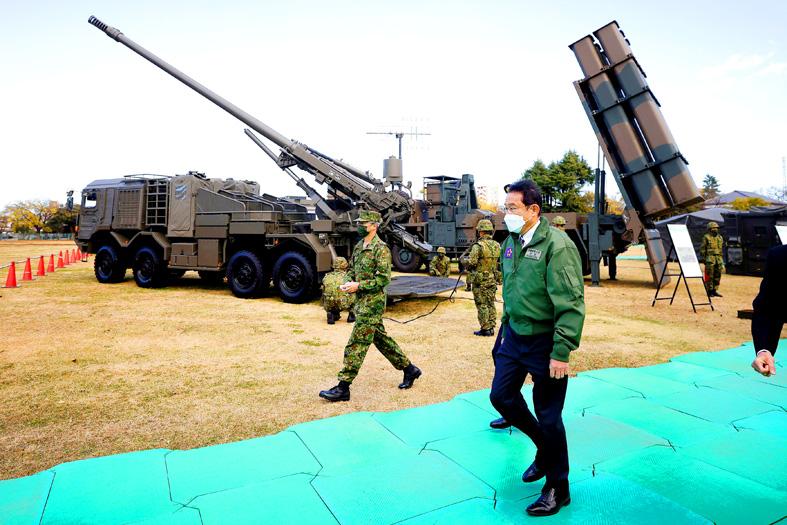Japan is considering the deployment of more than 1,000 long-range cruise missiles to increase its ability to counter growing regional threats from China, the Yomiuri Shimbun reported yesterday.
The country plans to upgrade its existing surface-to-ship missiles to extend their range from 100km to about 1,000km, which would be enough to reach Chinese coastal areas, as well as North Korea, the newspaper reported, citing unnamed sources.
Upgrades would also need to be made to enable Japan’s ships and aircraft to be able to fire the new missiles, which could hit land-based targets, the newspaper reported.

Photo: Reuters
The missiles would be deployed in and around the southwestern Kyushu region and on the small islands that dot Japan’s southwestern waters near Taiwan, the Yomiuri reported.
Japanese officials could not be reached for comment.
The plan is part of Japan’s attempt to narrow its missile capacity gap with China, while also addressing threats from North Korea, the newspaper said.
Japan’s military is not officially recognized under the country’s post-war constitution and defense spending is limited to funding nominally defensive capabilities.
Recent geopolitical tensions, including Russia’s invasion of Ukraine and China’s increasingly aggressive stance toward Taiwan, have prompted growing calls in Japan to review defense programs.
Regional tensions ratcheted up this month after a visit by US House of Representatives Speaker Nancy Pelosi to Taiwan. In response, Beijing launched missiles over Taiwan and into Japan’s exclusive economic zone.
Japanese Prime Minister Fumio Kishida has vowed to significantly boost defense spending, which has been kept near 1 percent of GDP.
Local media also reported that the Japanese Ministry of Defense is likely to request ¥5.5 trillion (US$40.2 billion) for the next fiscal year, up slightly from the ¥5.18 trillion requested for this fiscal year.
However, the ministry was also expected to ask approval for a list of unpriced items, including the development cost to upgrade the long-range cruise missiles, the Asahi Shimbun reported.
Additional reporting by Reuters

CHAOS: Iranians took to the streets playing celebratory music after reports of Khamenei’s death on Saturday, while mourners also gathered in Tehran yesterday Iranian Supreme Leader Ayatollah Ali Khamenei was killed in a major attack on Iran launched by Israel and the US, throwing the future of the Islamic republic into doubt and raising the risk of regional instability. Iranian state television and the state-run IRNA news agency announced the 86-year-old’s death early yesterday. US President Donald Trump said it gave Iranians their “greatest chance” to “take back” their country. The announcements came after a joint US and Israeli aerial bombardment that targeted Iranian military and governmental sites. Trump said the “heavy and pinpoint bombing” would continue through the week or as long

TRUST: The KMT said it respected the US’ timing and considerations, and hoped it would continue to honor its commitments to helping Taiwan bolster its defenses and deterrence US President Donald Trump is delaying a multibillion-dollar arms sale to Taiwan to ensure his visit to Beijing is successful, a New York Times report said. The weapons sales package has stalled in the US Department of State, the report said, citing US officials it did not identify. The White House has told agencies not to push forward ahead of Trump’s meeting with Chinese President Xi Jinping (習近平), it said. The two last month held a phone call to discuss trade and geopolitical flashpoints ahead of the summit. Xi raised the Taiwan issue and urged the US to handle arms sales to

State-run CPC Corp, Taiwan (CPC, 台灣中油) yesterday said that it had confirmed on Saturday night with its liquefied natural gas (LNG) and crude oil suppliers that shipments are proceeding as scheduled and that domestic supplies remain unaffected. The CPC yesterday announced the gasoline and diesel prices will rise by NT$0.2 and NT$0.4 per liter, respectively, starting Monday, citing Middle East tensions and blizzards in the eastern United States. CPC also iterated it has been reducing the proportion of crude oil imports from the Middle East and diversifying its supply sources in the past few years in response to geopolitical risks, expanding

Pro-democracy media tycoon Jimmy Lai’s (黎智英) fraud conviction and prison sentence were yesterday overturned by a Hong Kong court, in a surprise legal decision that comes soon after Lai was jailed for 20 years on a separate national security charge. Judges Jeremy Poon (潘兆初), Anthea Pang (彭寶琴) and Derek Pang (彭偉昌) said in the judgement that they allowed the appeal from Lai, and another defendant in the case, to proceed, as a lower court judge had “erred.” “The Court of Appeal gave them leave to appeal against their conviction, allowed their appeals, quashed the convictions and set aside the sentences,” the judges